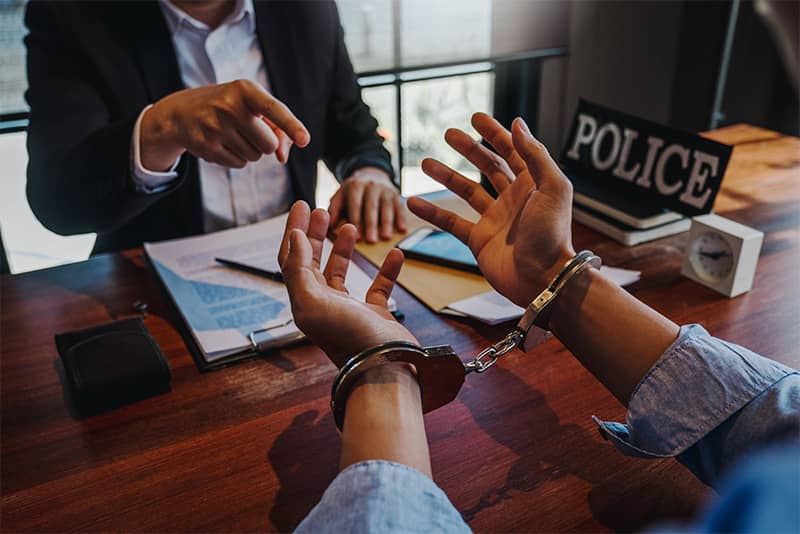How to Prove Your Innocence When Falsely Accused of a Crime

False accusations happen, and they can destroy lives. At Benjamin Durham Law Firm, we’ve seen innocent people face serious charges that threaten their freedom and future. The justice system isn’t perfect, but with the right strategy and legal team, you can fight back and prove your innocence.
Call Our Criminal Defense Attorneys Immediately
The single most important thing you can do when falsely accused is to contact our criminal defense lawyers right away. Don’t wait, don’t try to handle it yourself, and absolutely do not speak to the police without legal representation.
Here’s why:
- We protect your rights from the start. The earlier we get involved, the better we can safeguard your future.
- We can prevent you from making costly mistakes. Anything you say to law enforcement can be used against you, even if you’re innocent.
- We start building your defense immediately. Time is critical in preserving evidence and establishing your innocence.
Remember, the prosecution has the burden of proving guilt beyond a reasonable doubt. Our job is to create that doubt and prove your innocence. But we can only do that if you call us as soon as possible.
What We Do to Prove Your Innocence
Once you’ve contacted us, here’s how we’ll work to prove your innocence:
Gather and Preserve Evidence
Evidence is the cornerstone of proving your innocence. We’ll immediately start collecting:
- Alibis: If you were somewhere else when the alleged crime occurred, we’ll gather credit card receipts, GPS data, witness statements, and any other proof.
- Digital evidence: Text messages, emails, social media posts, and phone records can all help establish your innocence.
- Physical evidence: In some cases, DNA evidence, fingerprints, or other forensic evidence can exonerate you.
- Camera footage: We’ll seek out security cameras, traffic cameras, or even personal dashcams that might have captured footage supporting your innocence.
Investigate the Accuser
Understanding the motivations and credibility of your accuser can be crucial in proving your innocence. We’ll look into:
- Any history of false accusations or lying under oath
- Potential motives for making a false accusation (revenge, financial gain, custody disputes, etc.)
- Inconsistencies in their story
- Their reputation for truthfulness
Challenge the Prosecution’s Evidence
A key part of proving your innocence is poking holes in the prosecution’s case against you. We’ll:
- Question the reliability of eyewitness identifications
- Challenge the chain of custody for physical evidence
- Expose any procedural errors in how evidence was collected or processed
- Present alternative explanations for circumstantial evidence
Explore Forensic Evidence
In some cases, forensic evidence can be the key to proving your innocence. We’ll fight to make sure all relevant forensic evidence is properly analyzed and presented, including:
- DNA testing
- Fingerprint analysis
- Ballistics reports
- Computer forensics
Prepare for Trial
If your case does go to trial, we’ll ensure you’re thoroughly prepared. This includes:
- Practicing your testimony
- Preparing witnesses
- Anticipating and preparing responses to the prosecution’s arguments
- Developing a clear and compelling narrative of your innocence
Consider a Proactive Defense Strategy
Sometimes, waiting for your day in court isn’t the best strategy. We may recommend a proactive approach, such as:
- Presenting exculpatory evidence to the prosecutor before charges are filed
- Negotiating for charges to be reduced or dropped
- In rare cases, pursuing a plea bargain if the evidence against you is strong, even if you’re innocent (this is a last resort, but sometimes it’s the best way to minimize potential consequences)
What Not to Do When Falsely Accused
Just as important as knowing what to do is knowing what not to do:
- Don’t speak to the police without our criminal defense attorneys present. It’s your constitutional right to remain silent, and you should exercise it.
- Don’t discuss the case with anyone except us. Anything you say to friends, family, or coworkers could potentially be used against you.
- Don’t try to contact or confront your accuser. This could be seen as witness tampering or intimidation.
- Don’t destroy any potential evidence, even if you think it might look bad. Let us handle it.
- Don’t post about your case on social media. Anything you put online can be used against you.
Proving your innocence when falsely accused isn’t always a quick process. It can be frustrating and emotionally draining. But it’s crucial to remain patient and persistent. Trust in the legal process and in your defense team.
We’ve seen cases where charges were dropped on the eve of trial because new evidence came to light or where juries returned not-guilty verdicts after hearing all the facts. The key is to never give up and to keep fighting for the truth.
Don’t Face False Accusations Alone
Being falsely accused of a crime is one of the most stressful experiences a person can face. The potential consequences to your freedom, your reputation, and your future are enormous. That’s why it’s crucial to have an experienced criminal defense attorney on your side from the very beginning.
At Benjamin Durham Law Firm, we’ve helped countless clients prove their innocence in the face of false accusations. We know how to gather and preserve evidence, challenge the prosecution’s case, and present a compelling narrative of innocence.
If you or a loved one has been falsely accused of a crime, don’t wait. Contact our office today for a confidential consultation.



